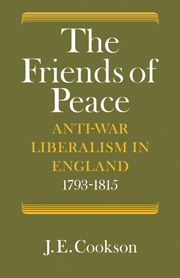Book contents
6 - WHIGS AND LIBERALS
Published online by Cambridge University Press: 07 October 2011
Summary
The campaign of 1794 was one of the most unsuccessful England had ever fought on the Continent, and it immediately forced the Pitt administration to revise its war aims. Pitt had little time for the doctrinaire politics of the conservative intellectuals, Burke and Windham. Policy, for him, was not a formulation of principles but a balance sheet of the probabilities. In 1793 he was not averse to war because the mood of the country was for it, Britain had interests to defend in the Low Countries, the French possessions overseas were vulnerable to attack and the war seemed likely to be of short duration. The public defence of the decision necessarily rested on the need to rescue Holland and drive the French from Belgium. As the prospect of total victory over the republic opened with the advance of the Allies into France and the outbreak of revolt against the Paris government, Pitt and his ministers also found it desirable and necessary to state that they stood for the restoration of the monarchy and the undoing of whatever else in the Revolution threatened the ‘independence and security of Europe’; this war aim was given most explicitly in the Declaration of 29 October 1793 and the Declaration of the British commissioners at Toulon in November. But the great forward rush of the French armies into first Flanders and then Holland in 1794 completely shattered both the public and confidential premises of the government's policy.
- Type
- Chapter
- Information
- The Friends of PeaceAnti-War Liberalism in England 1793–1815, pp. 142 - 162Publisher: Cambridge University PressPrint publication year: 1982

